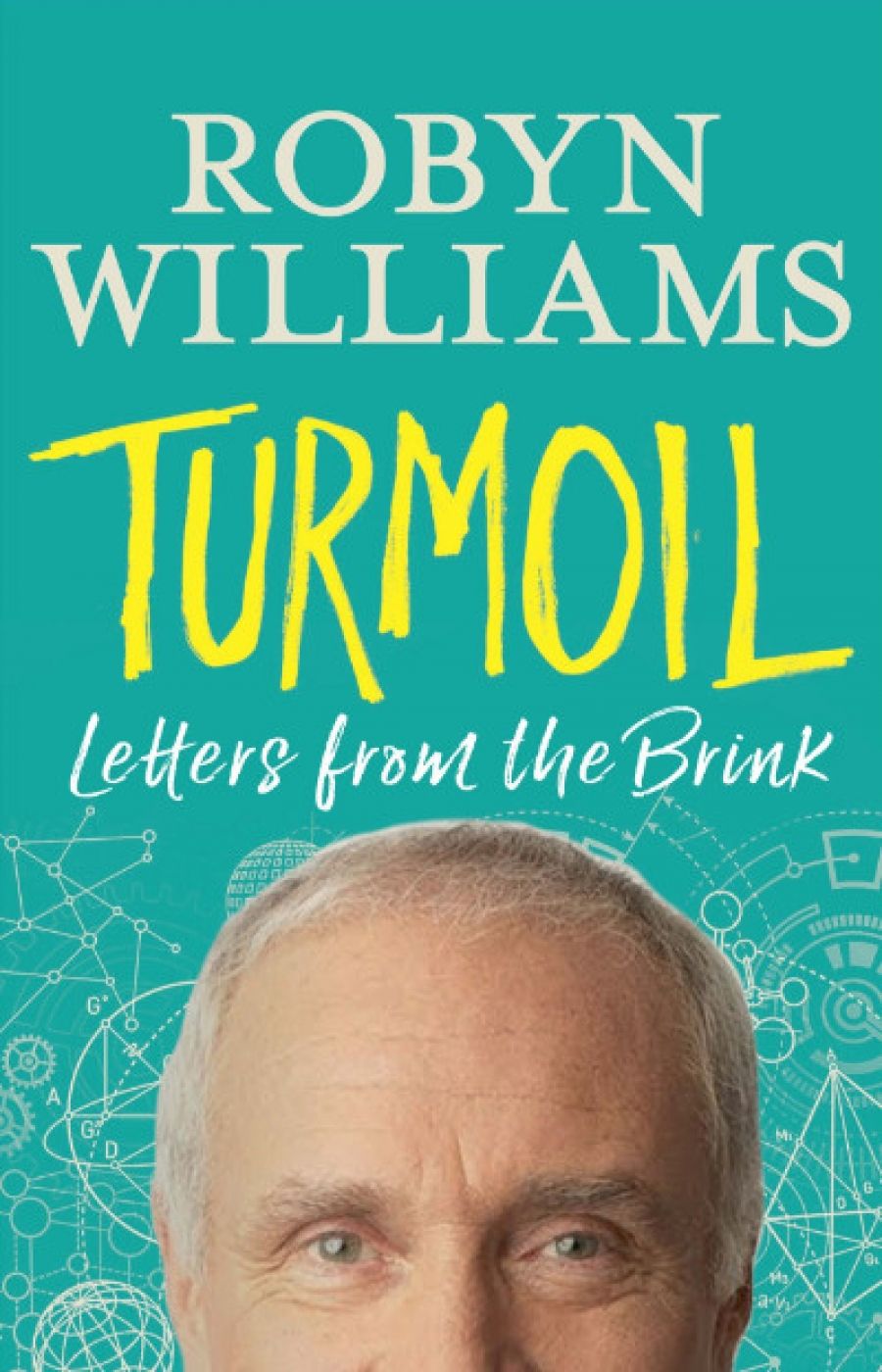
- Free Article: No
- Contents Category: Memoir
- Custom Article Title: Danielle Clode reviews 'Turmoil: Letters from the brink' by Robyn Williams
- Custom Highlight Text:
In 2014, veteran ABC science broadcaster Robyn Williams was diagnosed with bowel cancer. It was, he reports, his third brush with death, following cardiac arrest in 1988 and bladder cancer in 1991. His description of the experience, including surgical reduction of his gut and rectum and ...
- Book 1 Title: Turmoil: Letters from the brink
- Book 1 Biblio: NewSouth, $32.99 pb, 223 pp, 9781742235776
In characteristic fashion, Williams (and his wife and fellow science broad- caster, Jonica Newby) tackled his condition through research and the application of science. Unhappy with the impact of chemotherapy, they opted for a program of vigorous and ‘irksome’ exercise, which recent research has found to mobilise adrenaline and macrophages, cleaning up the body’s waste. It is a recipe Williams would clearly have us apply to society’s broader problems – review the scientific evidence, develop a rational response, and be prepared to step out of your comfort zone to achieve the results you need to survive.
The fact that this is not the approach modern society takes to its very obvious ailments clearly bewilders Williams. Raised in relative poverty (a ‘slum child’) by radical parents, Williams has an optimistic approach to the future that is hard to shake. The current climate, however, is giving that optimism a pretty solid beating. ‘Are we facing an age of confusion and failure?’ Williams asks, ‘A prelude to the kind of collapse that Jared Diamond writes about, but this time on a global scale? Or is this merely a short interlude, a transitory spell in the armpit of history before a new creative generation arises, no longer willing to dally with the squalor of present headlines.’
This is the turmoil of the title. The book is ‘an attempt to convince myself that the turmoil, this age of venom and spite and ignorance, is transitory. It cannot last because it is self-destructive. People are too good.’ Over his forty-six years as an ABC science broadcaster, Williams has presented plenty of evidence of what Australian and international scientists are capable of discovering and achieving, if only we would listen to them.
Williams admits that he has ‘a brain like an electric grasshopper’ and with so much material to choose from it is no small wonder that this wide-ranging and entertaining book darts across seemingly random topics with great rapidity. It is a book of paradoxes – of success and failures, of great intellectual achievements and abject stupidities, of a terrifying fear for the future held in check only by that passionate belief that good will prevail and that our progress, towards a brighter future, is inevitable.
Williams shares stories of remarkable researchers who are poorly acknow- ledged in their own country, the grief of losing colleagues, the perplexity of gender and unexplored privilege, the gross unfairness of modern management that promotes mediocrity and offers no rewards for quality, and the downright evil of ‘yellow journalism’ that breeds fear and stalls progress. The absurd accusations against the ABC and others of leftist bias by anyone incap- able of constructing a rational counter-argument clearly rankles. I am reminded of the chorus of Redgum’s 1983 battle cry for equal rights: ‘Well, if that’s being commo, it’s commo where we stand.’ Although, as Williams points out, it’s not commo at all, not even a delicate shade of pink. He reminds us of Alan Bennett, who noted on the apparently inevitable slide from left to right with age that ‘one has only to stand still to become a radical’.
 Robyn Williams at the ABC's William Street offices (Photo via ABC)
Robyn Williams at the ABC's William Street offices (Photo via ABC)
Williams clearly feels that he has had an inordinately lucky life. His achievements are many; he was the first journalist to be elected a fellow of the Australian Academy of Science. He has done for Australian science what Attenborough has done for wildlife, consistently and reliably bringing to our attention its importance and significance over decades. The lingering ‘death’ of the ABC by a thousand cuts has clearly taken its toll. The termination of hugely marketable content producers like the BBC Natural History Unit and Catalyst simply defies economic common sense. The steady erosion of health and science content has nothing to do with audience or popularity. What will happen when we no longer have such stalwart defenders to guard the gates? And yet Williams himself is unwilling to give in to such despair. Turmoil, he notes, is characterised by ‘terminal frustration’, temptation to just give up and let evil win. But there is no sense that Williams intends to do so.
It is clear that we need better issue of leadership. ‘We need experienced diplomats who know their history. We don’t need bully boys waving their rockets. We need people determined to maintain a civil society and who know, pace Thatcher, what society is made of. We need great leadership.’
In today’s bleak political landscape, it’s not at all clear where that leadership is going to come from, but Robyn Williams’s entertaining and insightful book helps us to remain determinedly hopeful that it will.


Comments powered by CComment